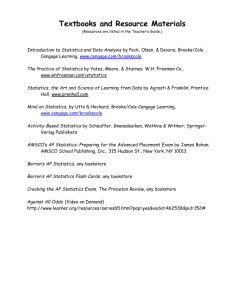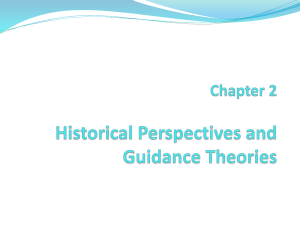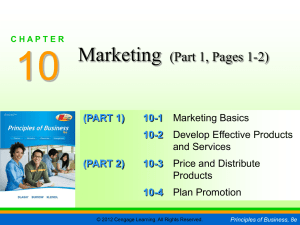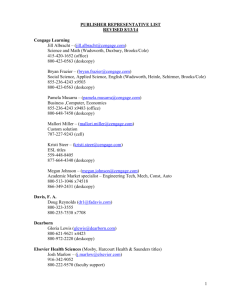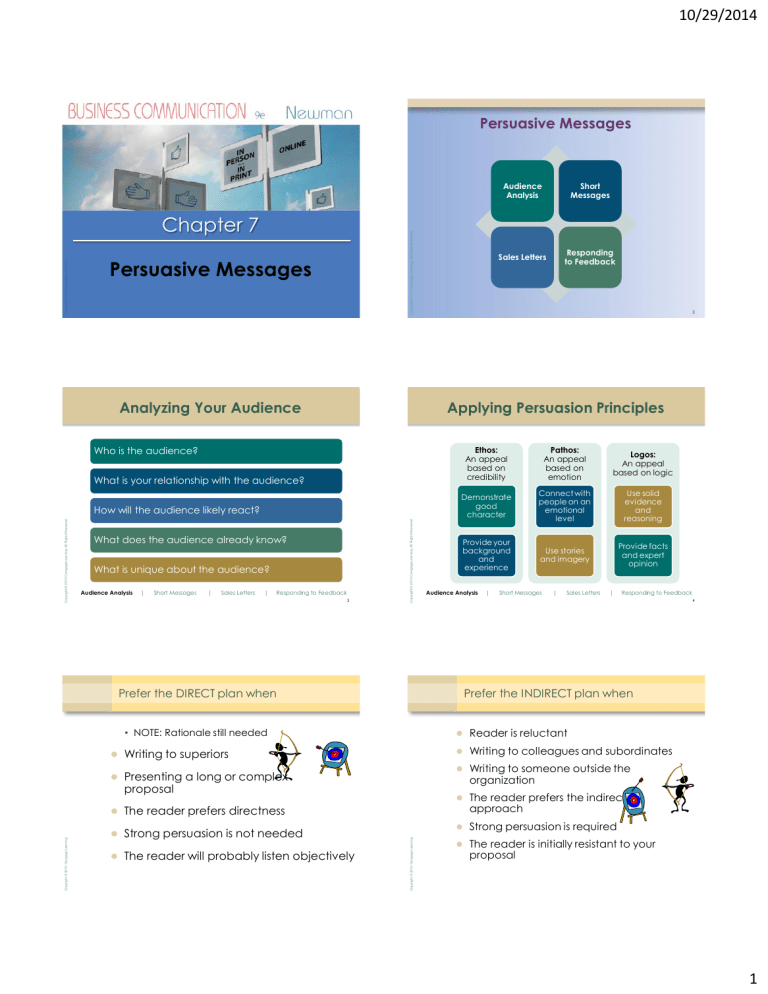
10/29/2014
Persuasive Messages
Copyright © 2015 Cengage Learning. All Rights Reserved.
Copyright © 2015 Cengage Learning
Chapter 7
Persuasive Messages
Analyzing Your Audience
What is your relationship with the audience?
What does the audience already know?
What is unique about the audience?
Short Messages
|
Sales Letters
|
Responding to Feedback
3
Copyright © 2015 Cengage Learning. All Rights Reserved.
Copyright © 2015 Cengage Learning. All Rights Reserved.
How will the audience likely react?
|
Prefer the DIRECT plan when
Sales Letters
Responding
to Feedback
2
Logos:
An appeal
based on logic
Demonstrate
good
character
Connect with
people on an
emotional
level
Use solid
evidence
and
reasoning
Provide your
background
and
experience
Use stories
and imagery
Provide facts
and expert
opinion
Audience Analysis
|
Short Messages
|
Sales Letters
|
Responding to Feedback
4
● Writing to someone outside the
● Presenting a long or complex
organization
proposal
● The reader prefers the indirect
approach
Copyright © 2015 Cengage Learning
● The reader prefers directness
● The reader will probably listen objectively
Pathos:
An appeal
based on
emotion
● Reader is reluctant
● Writing to colleagues and subordinates
● Writing to superiors
● Strong persuasion is not needed
Ethos:
An appeal
based on
credibility
Prefer the INDIRECT plan when
• NOTE: Rationale still needed
Copyright © 2015 Cengage Learning
Short
Messages
Applying Persuasion Principles
Who is the audience?
Audience Analysis
Audience
Analysis
● Strong persuasion is required
● The reader is initially resistant to your
proposal
1
10/29/2014
Compare Direct the Indirect Openings
I’ve come to expect
premium quality in the
products I purchase from
your company over the
last ten years. You can
imagine my
disappointment when the
shirt I purchased recently
faded after it was washed
the first time.
I’m writing to request that
you replace the shirt I
purchased because the
color has faded.
Audience Analysis
|
● Rhetorical question
Indirect
Short Messages
|
Sales Letters
|
Responding to Feedback
What is black and white and read
all over? Very few things, as a
matter
of fact!
Copyright © 2015 Cengage Learning
Copyright © 2015 Cengage Learning
Direct
Gain the reader’s attention.
Gain the reader’s attention
Practice Enticing Your Reader
● Unusual fact
Imagine a situation where you’re writing to a
prospective customer of your house cleaning service.
Write a catchy opening that meets these criteria:
A study conducted by IBM showed that participants
remembered almost twice as much of the
information on color slides as on black-and-white
slides.
• Interesting (perhaps a rhetorical question)
• Relevant to the audience (busy professionals)
• Short (one or two sentences)
● Reader/writer common ground
● Your purpose is to make sure your reader
gets to the body of your message.
Copyright © 2015 Cengage Learning
Copyright © 2015 Cengage Learning
Almost 95% of the participants at our four seminars
last month gave us an overall rating of
“Outstanding.”
Justifying Your Idea or Request
Facts and
Statistics
Audience Analysis
|
Use relevant, representative cases or
incidents to illustrate your points.
Short Messages
|
Sales Letters
|
Responding to Feedback
Short Messages
|
Sales Letters
|
Responding to Feedback
● The Lexcraft prints a four-color transparency in
Use objective statements and
statistics that can be verified. Choose
a few relevant data points to avoid
overwhelming the reader.
90 seconds at a cost of $1.80, including the
transparency.
● The Lexcraft rated a “Best-Buy” award in the
February issue of Personal Computing.
Include experts to support your points,
particularly if your credibility is in
question.
Examples
|
Examples:
● We spent $162.50 to have Imagemaster
Copyright © 2015 Cengage Learning
Copyright © 2015 Cengage Learning
Expert
Opinion
Audience Analysis
develop the 32 transparencies we used in last
month’s purchasing managers’ seminar. We
could have printed them on the Lexcraft for less
than $60— with same-day service.
2
10/29/2014
Dealing with Obstacles
Common Areas of Resistance
Address big
obstacles
directly
● Previous negative experience
● Limited time
Devote little
space to
objections
Audience Analysis
|
Short Messages
● Limited money
Incorporate
objections
into benefits
|
Sales Letters
|
Responding to Feedback
Copyright © 2015 Cengage Learning
Copyright © 2015 Cengage Learning
Anticipate
objections
Dealing with Objections
© ALEXARANDA/SHUTTERSTOCK
Audience Analysis
|
Short Messages
|
Sales Letters
|
Responding to Feedback
Dealing with Objections, continued…
● Put time, money in context of
● Specify time, money required to act
benefits they bring
• May be less than audience fears
• Example:
• Example:
Paying $17,500 for all three of us to attend
the summer institute will enable us to get
the thorough instruction we need to train
the rest of the staff.
Copyright © 2015 Cengage Learning
Copyright © 2015 Cengage Learning
Filling out the forms should only take 10
minutes. Your responses will be put into our
database—no more paperwork.
Dealing with Objections, continued…
Dealing with Objections, continued…
● Show that money spent now will
● Show that doing as you ask will
save money in long run
benefit something audience cares
about
• Example:
• Example:
By spending $4,000 now, we can upgrade
the labs in time to avoid a $6,500 fine for
noncompliance with the new regulations.
By becoming an e-mail mentor, you’ll give
an at-risk student the encouragement he or
she needs to stay in school.
Copyright © 2015 Cengage Learning
Copyright © 2015 Cengage Learning
● Indifference
3
10/29/2014
Dealing with Objections, continued…
Dealing with Objections, continued…
● Show audience need for sacrifice
● Show that advantages outweigh
to achieve larger, more important
goal
the disadvantages
• Example:
If we work just four additional hours each
week, we’ll be able to keep the shelter
open 24 hours a day, which will qualify us for
the new urban development grant.
Although relocating support staff to the
fourth floor means losing storage space,
having everyone in a central location will
greatly increase our efficiency.
Copyright © 2015 Cengage Learning
Copyright © 2015 Cengage Learning
• Example:
Reasons to Act Promptly
Reasons to Act Promptly, continued…
● Show that acting now will save time
● Show that time limit is real
or money
• Example:
• Example:
Returning the enclosed form by July 1 will let
us include your responses in our Executive
Board presentation on July 15.
Copyright © 2015 Cengage Learning
Copyright © 2015 Cengage Learning
When you return the acceptance notice
before October 1st, you will be guaranteed
the lower interest rate.
Reasons to Act Promptly, continued…
Minimize obstacles.
● Show the cost of delaying action
Deal with the obstacles: Show the reader that
despite these obstacles, your proposal still has
merit.
• Example:
•Although the vice president has asked for a moratorium on equipment
expenditures until June, if we purchase the $2,100 Lexcraft printer before
December 31, we’ll actually save that amount in printing costs by April,
before our quarterly budget is due.
Copyright © 2015 Cengage Learning
Copyright © 2015 Cengage Learning
The prices quoted are good until the first of
next month. After that, everything will
increase 5%.
4
10/29/2014
Motivating Action
Persuasive Messages
BUT:
State (or restate) the specific
request late in the message
End on a forward-looking
note, continuing to stress
reader benefits
NOT: I need your
recommendation
by Friday, or I’ll miss
my deadline!
Use a polite, sincere tone and
include compliments only
when they are sincere
Audience Analysis
|
Short Messages
|
Sales Letters
|
Responding to Feedback
25
Copyright © 2015 Cengage Learning. All Rights Reserved.
Copyright © 2015 Cengage Learning. All Rights Reserved.
Make the desired action clear
and easy for the reader to
take
Writing a sales letter
● What sets you apart?
Sales Letters
Responding
to Feedback
26
Interpret
Features
Devote several paragraphs to interpreting the
product’s features.
Use Vivid
Language
Copyright © 2015 Cengage Learning. All Rights Reserved.
Copyright © 2015 Cengage Learning
Introduce central selling theme early and keep
referring to it.
Short
Messages
Creating Interest and Building Desire
● Write indirect and use the AIDA plan.
● What is your central selling theme?
• If you emphasize everything, you
emphasize nothing.
• What is the most compelling benefit?
• Use position and repetition
Audience
Analysis
Interpret—don’t just describe.
Invite the reader to pay attention.
Use Objective,
Ethical
Language
Maintain credibility by providing specific facts
and figures.
Mention Price
Subordinate or downplay price in your
message.
Refer to
Enclosures
Audience Analysis
Refer to enclosures at the end of the letter.
|
Short Messages
|
Sales Letters
|
Responding to Feedback
28
Interpret—don’t just describe.
Not: This portable desk weighs only 12 ounces.
But: The Comfy Lap Desk’s 13"-by-31"
surface provides enough room to hold an open
encyclopedia and still have room to take notes.
Copyright © 2015 Cengage Learning
Copyright © 2015 Cengage Learning
Not: The Comfy Lap Desk is 13" by 31".
But: You don’t have to be afraid to rest this lap
desk on your knees for hours at a time. It
weighs just 12 ounces—about the same
as your favorite can of soft drink.
5
10/29/2014
Changing Features to Benefits
BUT:
Motivating Action
Make the action clear and easy to take
BUT:
Ask confidently
Audience Analysis
|
NOT: The
apartment
includes utilities.
Short Messages
|
Sales Letters
|
Responding to Feedback
Copyright © 2015 Cengage Learning
Copyright © 2015 Cengage Learning
Encourage prompt action
NOT: This
laptop battery
lasts 6-8 hours.
End your letter with a reminder of a
reader benefit
VELYCHKO/SHUTTERSTOCK.COM
Audience Analysis
|
Short Messages
|
Sales Letters
|
Responding to Feedback
6

